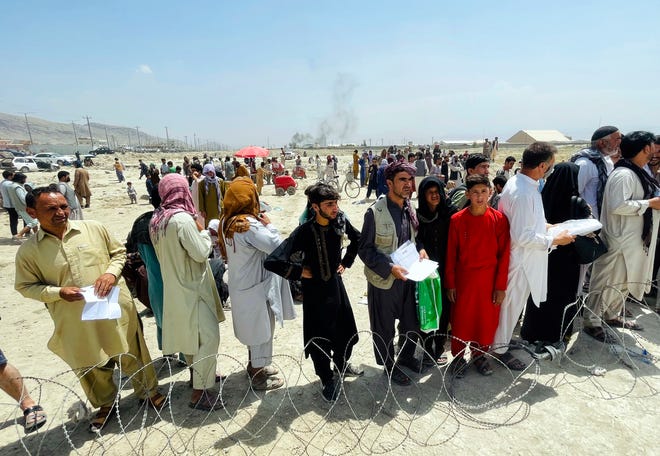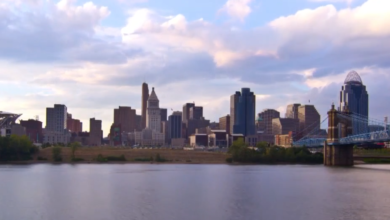
- Of those surveyed, 62%, put the responsibility for the Afghanistan war on George W. Bush.
- Half approved of his handling of the pandemic, 39% of his handling of the economy.
- Biden's decision to leave Afghanistan was approved of by most Americans.
- But only 26% approved of Biden's handling of the withdrawal.
Was the longest war worth it?
After two decades of combat, Americans by more than 2-1 say the war in Afghanistan, launched in the wake of the 9/11 attacks, wasn't worth it. In a new USA TODAY/Suffolk University Poll, three of four predict the Taliban-led country will once again become a haven for terrorists targeting the United States.
For President Joe Biden, the cost of the war's chaotic end has been steep. His overall job-approval rating now stands at 41% approve versus 55% who disapprove – a big drop in the closely watched barometer of political health. Until last week, national polls generally showed his approval rating above 50%.
Now, while he has held the backing of 87% of Democrats, only 32% of independents now say he's doing a good job.
The poll was taken Thursday through Monday, when the nation's headlines were dominated by scenes of desperate families trying to evacuate from the Kabul airport and a surge of COVID-19 cases across the United States.
Half approved of his handling of the pandemic, 39% of his handling of the economy, 26% of his handling of the Afghan withdrawal.
"Today, President Biden's overall approval has taken a turn for the worse due to his awful job performance rating on Afghanistan," said David Paleologos, director of the Suffolk Political Research Center. "His approval on immigration and the economy are also upside down. The only issue keeping him remotely in the game is his handling of the COVID-19 pandemic, where he is barely at 50%."
Latest on Afghanistan:U.S.-Taliban meeting reported, UN issues warning on human rights
Biden's decision to pull out troops was backed by most Americans, 53%-38%. But almost two-thirds, 62%, disapproved of the way his administration has handled that withdrawal.
"He basically handed the Taliban all these weapons, and he's inspired a resurgent ISIS now," said Aubrey Schlumbrecht, 51, from Lakewood, Colorado, who was among those polled. "He is not even taking any responsibility. He says he owns it, but he's blaming other people and he's blaming the Afghan people themselves."

John Plaskowsky, 55, a business manager from Suwannee, Georgia, said the news media's coverage of the tumultuous withdrawal has been unfair to Biden.
"I would say probably for the last 10 years they've been ignoring Afghanistan, then President Biden gets handed a horrible deal from the previous administration," he said in a follow-up interview. While noting that he is a Republican, he said former president Donald Trump played a role by negotiating with the Taliban for a U.S. withdrawal that was supposed to be completed by May 1.
"There needs to be some accountability to the previous administration on the deal they cut," he said.
Some say Afghanistan war was 'all for nothing'
Attitudes toward the war in Afghanistan and the leadership of the commanders-in-chief who waged it are complicated.
"There were objectives in the very beginning that were probably good objectives," said Leif Hassell, 46, a Democrat from Little Rock who was among those surveyed. "But we spent a long time there and used a lot of treasure and a lot of American lives. There was no clear goal, and there's been no clear benefit from it."
While most of those surveyed say Biden mishandled the exit in Afghanistan, few blame him for what went wrong in the war itself. Among those who say the war wasn't worth it – a view held by 60%-28% – just 7% identify Biden as the president who is most responsible for that. Fifteen percent cite Barack Obama, who vowed to end U.S. participation in the war and didn't.

Nearly two-thirds, 62%, put the responsibility on George W. Bush, the president who ordered the invasion in 2001.
"He's the one that had the big push into Afghanistan," said Ryan Haugh, 27, of Camphill, Pennsylvania. "After 9/11, I think there was very few Americans that were against war at that point because of what happened with the World Trade (Center) and the Pentagon. But I think some of the reasons that we were there were the wrong reasons. And then, ultimately, if you look at the end goal, or the end game, where we're at now, it's kind of just like it was all for nothing."
Foreign policy and defense strategists in a string of administrations say the war was a success in routing the Taliban and combating terrorist groups, if not in establishing a stable democracy.
But now 73% of Americans believe Afghanistan will once again become a base for terrorists who want to attack the United States. There is scant support for developing diplomatic relations with the emerging rulers there; 71% say the United States should not recognize the Taliban as the legitimate government of Afghanistan.
Huge support for admitting Afghan translators
"I think that there's blame all around to be shared," said Kristopher Charles, 30, a pharmacy technician and a Democrat from Fishkill, New York. "President Biden said this was not the most ideal situation. Some of the blame has to be taken by his immediate predecessor as well as George W. Bush having us go to Afghanistan when really we had no business going there. Some blame has to go to Congress and the military as well."
On one issue, nearly everyone agreed, and across party lines. By 84%-10%, those surveyed said the Afghans who had worked as translators for the U.S. military – and as a result may now be targeted for retribution – should be eligible for special refugee visas. Their admission to the United States with their immediate family members was supported by 79% of Republicans and 90% of Democrats.
"How will the rest of the world view the American people if we can't even help the people that helped us?" said Albert Lopez, 37, of Orange County, New York. The war in Afghanistan began with good intentions but ended in a "terrible" failure, he said. "We were fighting terrorism at the beginning, so something needed to get done, and then it got carried away, prolonged, maybe too long."
Source link








